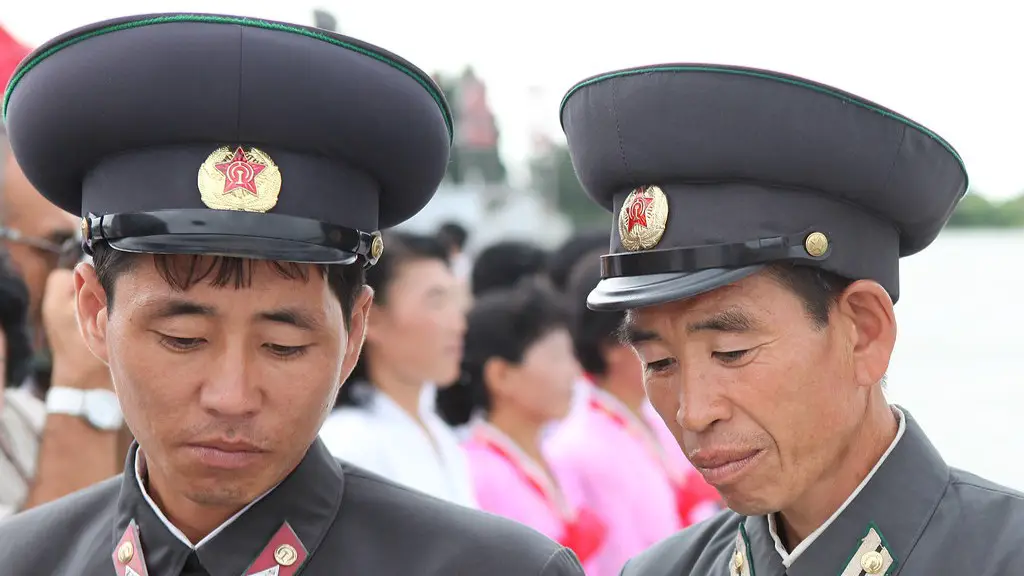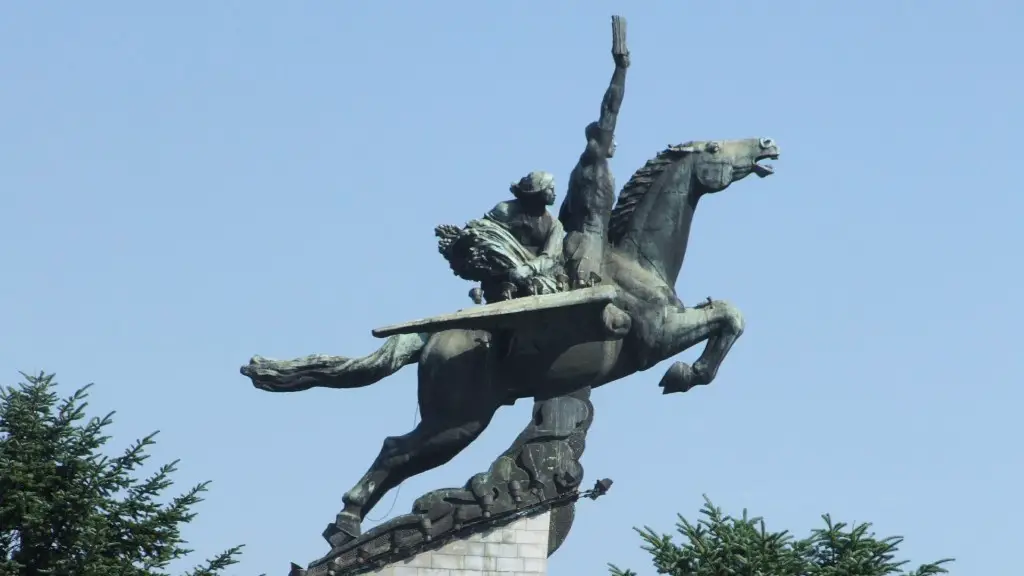Part 1: Will North Korea Start A Nuclear War?
Over the past decades, North Korea has been threatening to start a nuclear war with the Western world as a way of gaining diplomatic and economic power. Many countries, including South Korea, have expressed concern over the possibility of North Korea launching nuclear weapons, while other nations have seen it as a bargaining chip.
One of the key factors that have made North Korea a target of international focus and attention is the regime’s rapidly growing nuclear capabilities, which are said to be capable of launching a nuclear strike against any target in the world. The country has maintained a nuclear weapons program since the 1950s, and has twice tested nuclear weapons since 2006, sending shock waves around the world.
Since then, North Korea has continually tested and developed its nuclear program, and has become one of only nine countries known to have nuclear weapons. Moreover, the regime has openly stated its intention to continue to develop nuclear weapons, claiming it is necessary for the state’s “self-defense”.
Moreover, North Korea has been highly successful in spite of international sanctions and other attempts at non-proliferation, making its nuclear program even harder to contain. The country has also demonstrated a willingness to flaunt international law, as it has both tested weapons in the face of sanctions, and refused to provide access to international monitors, a move that fuels further concerns.
The economic consequences of a nuclear attack by North Korea could also be severe, due to the devastating impact a warfare would have on global economies, markets, and trade. This could lead to worldwide economic instability, and could result in the collapse of global markets.
Nevertheless, the possibility of a nuclear war initiated by North Korea is not without opposition. The United Nations has maintained a strict position against such an attack, and the international community is actively monitoring North Korea’s activities and applying pressure on its government whenever possible.
Part 2: North Korea’s Disregard for International Mediation
In spite of international mediation to curb nuclear proliferation, North Korea continues to expand its armed forces and test their nuclear weapons. A fact-finding mission in 2019 concluded that North Korea was still enhancing its nuclear capabilities, calling it “highly destabilizing”.
The mission also noted that the country had “made several attempts to evade the international community’s nuclear non-proliferation efforts”, with no signs of stopping anytime soon. It also said Pyongyang had refused to cooperate with international mediators and negotiations, which can only make the situation worse.
Moreover, the mission pointed out that North Korea also refused to join the Treaty on the Non-Proliferation of Nuclear Weapons, an international treaty that seeks to prevent the spread of nuclear weapons and weapons technology. This refusal is a clear indication of the country’s disregard of the international community’s efforts to bring a peaceful end to the crisis.
It is also noteworthy that North Korea has refused to participate in regional talks with regional powers, including South Korea and Japan. This further reduces the chances of successful international mediation and makes the situation even more volatile and dangerous.
What is also concerning is that North Korea has refused to abide by its commitment under the Treaty of Non-Proliferation of Nuclear Weapons. This means that North Korea could potentially use the weapons already in its possession to blackmail the world.
Finally, it is also worth mentioning that the North Korean regime has failed to abide by the UN Security Council Resolution 1718 and Resolution 1874, which set out limits to the testing, development or use of nuclear weapons.
Part 3: Trump’s Attempts at Negotiations
In 2017, US President Donald Trump sought to open a new round of negotiations with North Korea in order to curb Pyongyang’s nuclear ambitions. He met with the supreme leader Kim Jong Un a number of times in an attempt to reach an agreement and ultimately put an end to the crisis.
The United States put in place several economic sanctions, including limits on the export of luxury goods, oil and coal as well as an outright ban on the sale of North Korean textiles, Weapons, and metal. Nevertheless, North Korea has made several attempts to circumvent the sanctions and has increased the number of nuclear and missile tests.
Despite some progress with these talks, they ultimately failed to bring an end to the crisis, and a second summit between Trump and Kim in 2019 also came to an end without any concrete agreements being reached. It remains to be seen if further negotiations or other forms of diplomacy are possible.
The Trump administration has also imposed stronger sanctions, including the freezing of assets and blocking of North Korea’s access to the US financial system. Such direct intervention has been seen as an attempt by the US to strengthen its own position and deter North Korea from launching a nuclear attack.
While the US has justified its hardline approach as an attempt to prevent the outbreak of a nuclear war, it has also been criticised for its aggressive approach towards North Korea. It has been argued that this could further increase tensions and make a peaceful resolution to the crisis more difficult to achieve.
Part 4: Russia’s Role
Russia has long been a key player in the region, and has been involved in negotiations with North Korea regarding its nuclear weapons program. Moscow has in the past provided Pyongyang with much-needed economic assistance, and has long been seen as a source of support for the regime.
Moscow has also provided North Korea with diplomatic cover, helping to prevent a harsher international response to the country’s actions. In addition, Russia has consistently called for negotiations and dialogue, hoping to de-escalate tensions and find a long-term solution to the crisis.
Russia has also provided diplomatic support for North Korea’s efforts to re-engage with the United States and has pushed for the implementation of the agreements reached between the two countries at the historic 2018 summit in Singapore.
Russia’s position has been seen as an attempt to avoid a military confrontation between North Korea and the US, and it is likely that Moscow will continue to play a key role in the diplomatic efforts to avert a war. This is because Russia is one of the few countries with which North Korea has strong relations, and also has its own interests in the region.
Russia’s diplomatic efforts have been unswerving, although they have yet to be successful in fully resolving the crisis. Nonetheless, it is possible that Russia’s involvement could lead to a less fraught diplomatic climate, and a positive outcome for the region.
Part 5: China’s Involvement
China has historically been seen as a key ally of North Korea and has been heavily involved in negotiations regarding Pyongyang’s nuclear ambitions. In addition to providing much-needed economic assistance, China has also maintained a strong diplomatic presence in the region.
China has repeatedly called for a peaceful resolution to the crisis, and has supported the Six-Party talks, a series of negotiations between China, Japan, the US, Russia, South Korea and North Korea, aimed at finding a peaceful resolution to the crisis.
Nevertheless, China’s involvement in the crisis has been limited by its interests in maintaining stability in the region and avoiding any potential conflict that could lead to a US military intervention. Furthermore, China has been wary of any US-led negotiations, as it does not want Pyongyang’s nuclear ambitions to be used against it or its interests in the region.
In recent years, China has sought to expand its influence in the region, and has increased its diplomatic activities in both North and South Korea. However, it should be noted that Chinese involvement has not been without criticism and controversy.
Critics have argued that China has not done enough to prevent the outbreak of a war, and has instead been more concerned with protecting its own economic interests. Furthermore, Beijing’s increasingly assertive stance in the region has been seen as an attempt to compete with the US as the dominant power in East Asia.
Part 6: Japan’s Role
Japan has been one of the most vocal critics of North Korea’s nuclear program, and has been actively involved in diplomatic efforts to prevent a nuclear war. Japan has also imposed economic sanctions on Pyongyang, including banning exports of luxury items and cash transfers.
In addition, Japan has placed restrictions on North Korean ships entering its territorial waters, and has imposed a blanket ban on North Korean imports. This is seen as an attempt to pressure North Korea into abandoning its nuclear ambitions.
Japan has also been an active participant in the Six-Party Talks, a series of negotiations between Japan, the US, Russia, South Korea and North Korea in pursuit of a peaceful resolution of the crisis. Tokyo has argued that dialogue is only possible if the negotiations are based on the assurance that North Korea will completely abandon its nuclear aspirations.
Japan’s presence in the region has also been seen as an attempt to counter any potential US-led military intervention, as Tokyo does not want to see the US taking unilateral action against North Korea. Japan has thus sought to be a mediating force, so as to ensure an end to the crisis without the need for military force.
Nevertheless, Japan’s involvement has often been marred by controversy and criticism, as it has been accused of being too aggressive in its stance. As such, Japan’s involvement has been limited in scope and its influence within the region has waned in recent years.
Part 7: South Korea’s Position
South Korea has historically been an ally of the United States and is a key player in the region in regard to the North Korea crisis. South Korea has imposed stringent economic sanctions on North Korea, and has argued for dialogue and negotiations as a way to resolve the crisis.
Furthermore, South Korea has been closely involved in the Six-Party Talks, as well as in other regional initiatives aimed at bringing a peaceful resolution to the conflict. South Korea has also argued for a diplomatic solution, and has sought to foster dialogue and cooperation between the two Koreas.
South Korea has also provided North Korea with much-needed economic assistance, including aid and medical supplies, in an attempt to pressure North Korea to abandon its nuclear program. In addition, South Korea has put in place a number of measures to limit North Korea’s economic activity, including banning certain imports and restricting the amount of money North Koreans can send and receive.
South Korea has also taken a leading role in international diplomatic efforts to bring a peaceful resolution to the crisis, and has sought to work with other countries in the region to contain North Korea’s nuclear ambitions.
Overall, South Korea has been a key player in the efforts to find a peaceful resolution to the crisis, and has taken a pragmatic and measured approach to the issue. It remains to be seen if these efforts will bear fruit and ultimately bring an end to the crisis.




